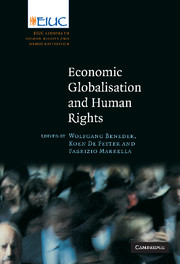Book contents
- Frontmatter
- Contents
- List of contributors
- Series editors' preface
- Preface
- List of abbreviations
- Introduction
- PART I Inter-disciplinary Perspectives on Human Rights and Economic Globalisation
- PART II The Relevance of Human Rights for International Economic Organisations
- PART III International Corporate Accountability
- Alternative Perspectives on International Responsibility for Human Rights Violations by Multinational Corporations
- Human Rights, Arbitration, and Corporate Social Responsibility in the Law of International Trade
- General Conclusions
- Index
Alternative Perspectives on International Responsibility for Human Rights Violations by Multinational Corporations
Published online by Cambridge University Press: 09 July 2009
- Frontmatter
- Contents
- List of contributors
- Series editors' preface
- Preface
- List of abbreviations
- Introduction
- PART I Inter-disciplinary Perspectives on Human Rights and Economic Globalisation
- PART II The Relevance of Human Rights for International Economic Organisations
- PART III International Corporate Accountability
- Alternative Perspectives on International Responsibility for Human Rights Violations by Multinational Corporations
- Human Rights, Arbitration, and Corporate Social Responsibility in the Law of International Trade
- General Conclusions
- Index
Summary
Introduction
When in 1945 the United Nations Charter laid the foundation for the development of the modern law of human rights, the intent of the drafters was to protect and promote the dignity and equal rights of individuals from the arbitrary use of governmental powers. International human rights were conceived in a vertical dimension as claims against the state, as instruments to safeguard the dignity and autonomy of human beings against the hitherto unlimited authority of the state in respect of its subjects. In the second part of the last century, international standardsetting in the field of human rights, both at a universal and at a regional level, developed along much the same vertical dimension and states remained the typical addressees of the international obligation to respect, protect and fulfil human rights.
Today, the attention of international lawyers is gradually shifting from state to non-state actors, especially large business enterprises, as a possible cause of human rights violations. This is not because states have ceased to commit human rights abuses: it is sufficient to see the chaos in many developing countries, the violent oppression by dictatorial regimes, the discrimination produced by religious and ideological fundamentalism,and the persistence of war, including the ‘War on Terror’, to realise that the power of the state is still at the origin of most human rights abuses. The reasons for this shift of focus are related, to some extent, to the process that, with a ubiquitous term, we call globalisation.
- Type
- Chapter
- Information
- Economic Globalisation and Human RightsEIUC Studies on Human Rights and Democratization, pp. 245 - 265Publisher: Cambridge University PressPrint publication year: 2007
- 2
- Cited by



